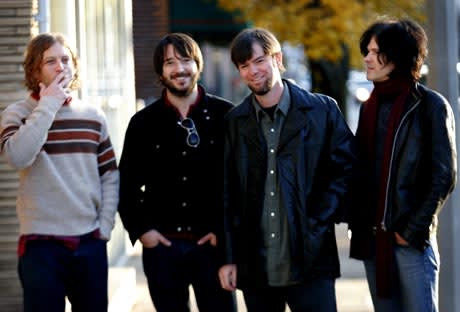Okemah and the Melody of Riot finds songwriter Jay Farrar with Woody Guthrie on his mind. Okemah is the Oklahoma birthplace of the folk and the protest singer from the 1940s and early 50s and throughout Son Volts first album in seven years, Farrar makes several references to the folk icon. This disc also finds Farrar teaming up with a new band of musical mates, as the original line-up left due to creative differences. Following a mellower period for Farrar that saw him release a few solo albums, which were acoustic-based, here he turns the amps up again with renewed energy and rocks out hard. The album kicks off with "Bandages and Scars, a track that hints at the energy and wit to come. Here is where Farrars first reference to Guthrie occurs when he croons in the chorus, "Words of Woody Guthrie ringing in my head. Next up is the homage to one of Americas off the beaten path highways, "Afterglow 61 a stretch of road Farrar loves for its simplistic beauty, and lack of commercialisation. Overall, Okemah and the Melody Riot finds Farrar connected with this new Son Volt line-up; these 13 new original tracks show the songsmith is back with a vengeance.
Do you consider yourself a modern bearer of Woody Guthries torch? Hes an influence, but I dont see myself as a modern bearer of that torch though. Woody is a point of reference and over the years hes been a source of inspiration. I guess during times of political turmoil, which I felt was going on in this country at that time, you turn to someone like him for inspiration and solace.
You often look to the past to understand the present in your songs? I like taking the approach of looking back to see the historical perspective to find meaning to what is going on now; thats important, and so that finds its way into the writing. Looking back to the past provides a bigger perspective to what happens in the future. The U.S. have never been very progressive, but they have always managed to survive. I dont things will really change unless there is another depression.
Legacy is traditionally a reissue label. How did you choose them? It was more about finding people that I thought I could work with and who would have a shared responsibility. There are people I know that I have a mutual appreciation for. For them, its a welcome challenge to put out something current.
(Transmit Sounds/Legacy)Do you consider yourself a modern bearer of Woody Guthries torch? Hes an influence, but I dont see myself as a modern bearer of that torch though. Woody is a point of reference and over the years hes been a source of inspiration. I guess during times of political turmoil, which I felt was going on in this country at that time, you turn to someone like him for inspiration and solace.
You often look to the past to understand the present in your songs? I like taking the approach of looking back to see the historical perspective to find meaning to what is going on now; thats important, and so that finds its way into the writing. Looking back to the past provides a bigger perspective to what happens in the future. The U.S. have never been very progressive, but they have always managed to survive. I dont things will really change unless there is another depression.
Legacy is traditionally a reissue label. How did you choose them? It was more about finding people that I thought I could work with and who would have a shared responsibility. There are people I know that I have a mutual appreciation for. For them, its a welcome challenge to put out something current.




